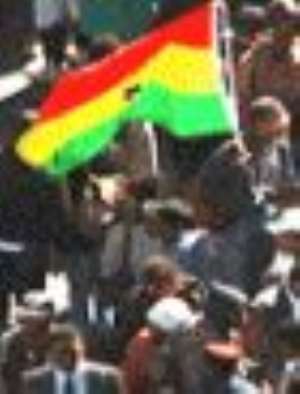
Improvement in key macroeconomic indicators during the third quarter of 2003. Disinflation, as inflation has continued with downward trend Twelve month CPI down from 29.6% in June to 27.7% in August. Interest rate on a downward slope with T-Bill rate moving down from 34.0% in June to 25.0% at end of September. Commercial lending rates are however stagnant. Domestic primary surplus of ¢758.4 billion (1.16% of GDP) compared to projected of 0.96% of GDP. net domestic financing down to minus ¢793 billion (-0.75% of GDP), compared to budgeted deficit of ¢122 billion (0.10% of GDP) Provisional data indicates that improved government finances. Total receipts YTD September amounted to ¢13,014 billion (71.0% over 2002) whilst total expenditure was ¢12,381 billion (40% over 2002) Money growth has slowed down from 42.6% in December 2002 to 32.4% in September 2003. Relative stability of the currency with an interbank cedi depreciation of 3.50% against the US dollar since the begining of the year. Much improved balance of payments with a 74.4% increase in cocoa earnings (US$578.5 million) and an 18.4% increase in gold earnings (US$591.3 million). Gross international reserves have increased from US$880 million in July to US$ 1,012 million by end of September 2003 representing 3.4 months of import cover (as against a budgeted figure of 2.3 months) Ghana Stock Exchange has shown strong performance with a gain of 104.44% on the GSE All Share Index and 105.35% on the Cedi Databank Stock Index (DSI). This represents a real (dollar )gain of 96.74% as at October 20, 2003.




 Lay KPMG audit report on SML-GRA contract before Parliament – Isaac Adongo tells...
Lay KPMG audit report on SML-GRA contract before Parliament – Isaac Adongo tells...
 Supervisor remanded for stabbing businessman with broken bottle and screwdriver
Supervisor remanded for stabbing businessman with broken bottle and screwdriver
 NDC watching EC and NPP closely on Returning Officer recruitment — Omane Boamah
NDC watching EC and NPP closely on Returning Officer recruitment — Omane Boamah
 Your decision to contest for president again is pathetic – Annoh-Dompreh blasts ...
Your decision to contest for president again is pathetic – Annoh-Dompreh blasts ...
 Election 2024: Security agencies ready to keep peace and secure the country — IG...
Election 2024: Security agencies ready to keep peace and secure the country — IG...
 People no longer place value in public basic schools; new uniforms, painting wil...
People no longer place value in public basic schools; new uniforms, painting wil...
 'Comedian' Paul Adom Otchere needs help – Sulemana Braimah
'Comedian' Paul Adom Otchere needs help – Sulemana Braimah
 Ejisu by-election: Only 33% of voters can be swayed by inducement — Global InfoA...
Ejisu by-election: Only 33% of voters can be swayed by inducement — Global InfoA...
 Minority will expose the beneficial owners of SML, recover funds paid to company...
Minority will expose the beneficial owners of SML, recover funds paid to company...
 Prof. Opoku-Agyemang has ‘decapitated’ the NPP’s strategies; don’t take them ser...
Prof. Opoku-Agyemang has ‘decapitated’ the NPP’s strategies; don’t take them ser...
